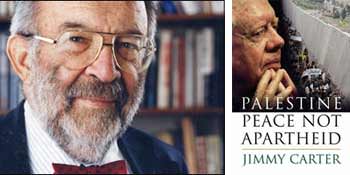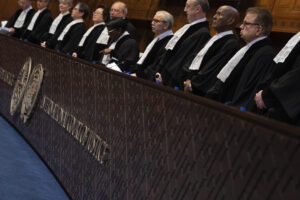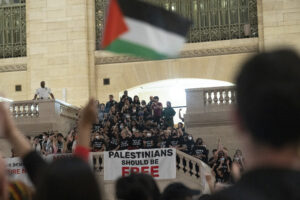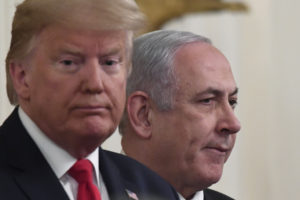Sheinbaum: Carter’s ‘Apartheid’ Mistake
Internationally renowned diplomat, peace activist and scholar Stanley Sheinbaum (above) discusses Jimmy Carter's controversial new book, "Palestine: Peace Not Apartheid."
Truthdig speaks with the internationally renowned diplomat, peace activist and scholar Stanley Sheinbaum about Jimmy Carter’s controversial new book, “Palestine: Peace Not Apartheid.”
Sheinbaum has long been active in the Israeli-Palestinian peace process. In 1988 he headed a nongovernmental delegation of five American Jews that succeeded in getting Yasser Arafat to recognize Israel and to disavow terrorism.
He has been a board member of the International Center for Peace in the Middle East in Tel Aviv since 1982 and a board member of Americans for Peace Now since 1988.
He was chairman of the American Civil Liberties Foundation of Southern California and a regent of the University of California.
Currently the publisher of New Perspectives Quarterly, Sheinbaum remains active in Mideast peace efforts, along with a host of other progressive issues. He speaks here with Truthdig research editor Joshua Scheer.
Truthdig: What is your impression of the Jimmy Carter book?
Sheinbaum: Very serious, very intelligently written and laid out; putting in all sorts of components that were important to have included, such as the records of the various agreements that were made, starting way back in the first century and bringing it right up to date in about a dozen pages.
Truthdig:
It’s called “Palestine: Peace Not Apartheid.” How does this come up?
Sheinbaum: My take on it was that Carter was trying to use the concept of apartheid as a way of creating an interest in the problem, but not making an accusation about it, [not] that this was an apartheid scheme as we understand it from South Africa, but rather that there were components that should lead to a discussion and have Jews everywhere thinking about what the implications of the policy were. And the major component, as you probably know, is the occupation of Palestinian lands, especially in the West Bank, which is not considered part of Israel, or hasn’t been. But a number of Israelis and hard-line American Jews have wanted to consider it [a part of Israel].
Truthdig: Is Carter critical of the Palestinians and their involvement in bombings and actions of that sort?
Sheinbaum: Yeah, he gets into the question. Especially of Hamas, which he practically calls a terrorist organization.
Truthdig: Would you call it a balanced book?
Sheinbaum: Yes.
Truthdig: Some have criticized the book [as] not being historically accurate, that it lacks some facts. Did you find that to be true?
Sheinbaum: No. As I said, he has a chronology going way back to the first century, with the various components, and bringing it up to the 21st century; various agreements that were made, [and] when they were not adhered to, when they were adhered to, and he is very articulate about that.
Truthdig: Some of his other books have been about a less controversial subject matter; do you think he knew what he was getting into when he wrote this book?
Sheinbaum: I think he made a serious mistake, to answer that question, when he applied the term “apartheid.” He was hoping to use the concept of apartheid as something that would create a dialogue or a debate. But instead, it created accusations against him, that he was equating what was going on in the occupied lands with what went on in South Africa.
Truthdig: So in your mind his only mistake was using the term “apartheid”?
Sheinbaum: Yes.
Truthdig: Is it a good book?
Sheinbaum: It’s a good book.
Truthdig: Did he recognize his role in possibly contributing to the creation of Al Qaeda, and therefore increasing terrorism, through his actions in Afghanistan when he was president of the United States, or was that not in the book?
Sheinbaum: I don’t recall that being in the book.
Truthdig: It’s interesting because of [Zbigniew] Brzezinski [the architect of the strategy of supporting the mujahedeen in Afghanistan against the Soviets; the Afghan “freedom fighters” later formed the Taliban]… .
Sheinbaum: Yeah, the one thing that sort of startled me was that he talks about Bill Clinton as having been determined to bring about peace between Palestinians and the Israelis. But then under Bill Clinton’s tenure, the Israelis occupied much of the West Bank. And it’s almost as if Clinton sanctioned that.
Truthdig: Do you think Clinton did that? Do you think that was a mistake in the book not to mention it?
Sheinbaum: No, I think that was a mistake on Clinton’s part.
Truthdig: You were intimately involved in the peace process. Can you explain what you did, and would that method perhaps work today?
Sheinbaum: No, it’s not as easy today. The tensions are greater, the divisions are greater, and the self-interest is stronger than ever, on both sides. The Israelis are moving into large areas of the West Bank, and for the Palestinians this is a hostile thing to do; it keeps them further from coming to terms with the Israelis.
Truthdig: How did you help to create peace, if only temporarily?
Sheinbaum: Well what I did, as you may know, I organized a group of five American Jews including myself, to go deal with Arafat, who was then the leader in some vague way of the Palestinians. [We tried] to get him to accept … Israel as a national state, and to disavow terrorism, which he did … and that was a significant thing to do, and then there was a lot of pressure on him from the hard-line Palestinian side to back off.
Truthdig: Is that why the peace did not last?
Sheinbaum: It didn’t last … because the intensity from the hard-line Palestinian side was very strong.
Truthdig: When you went to meet with Arafat, what was the reaction in the Jewish community?
Sheinbaum: Very negative.
Truthdig: Why was that?
Sheinbaum: At one point, when I got back, there where dead pigs thrown in my driveway.
Truthdig: Is there any way to take action toward peace without having such hate directed at you?
Sheinbaum: Well, anyone who talks to an enemy is himself an enemy.
Truthdig: Was this worth it to you?
Sheinbaum: Well, I got Arafat to accept the concept [of an Israeli state], and to disavow terrorism.
Truthdig: In your estimation, is there any politician out there today with a plan, or at least the courage to take on this issue and risk being labeled an anti-Semite?
Sheinbaum: I’m really not aware of anyone.
Truthdig: I’m still having a hard time understanding why people would be so opposed to your efforts to foster peace. Why would they call you a Jew-hater and an anti-Semite, especially since you are Jewish?
Sheinbaum: In political conflict you get these kinds of reactions. If they’re not on your side and there are political things at stake, then the antipathies are really very strong.
Truthdig: This is a quagmire, probably the worst situation in the world.
Sheinbaum: Oh yeah, this cannot go on.
Truthdig: What could fix the problem? As you said, the divisions are great, so the peace efforts that worked before will likely not work again. So what could work now?
Sheinbaum: There are tensions in the Middle East that are now very strong and could lead to explosions of an undetermined nature, and everything must be done to stop that.
Truthdig: Do you have a plan for that yet?
Sheinbaum: No.
Truthdig: Are you working on one?
Sheinbaum: No, I’m not. … I’m not allowed to travel anymore. I have had some physical problems. … And to get involved in an active way … [when] you can’t travel — it’s almost impossible. I should say that I’m trying to keep in touch with those American and international Jews who think similarly to myself.
Truthdig: So you are still as active as you can be without being able to travel?
Sheinbaum: Yeah.
Truthdig: Do you think Carter’s book is a good attempt to try to find a peaceful solution?
Sheinbaum: Yeah, and I think it’s unfortunate that provocative term “apartheid” was included, because it’s turning people against the book. People like Alan Dershowitz and Marty Peretz of The New Republic are misinterpreting it.
Truthdig: Dershowitz wrote that he was upset by Carter’s unwillingness to engage in a public debate. Would you like to see a debate?
Sheinbaum: Sure.
Truthdig: So the “apartheid” term is really the key point here?
Sheinbaum: It’s the trigger.
Truthdig: They probably intended to use it to sell books, with that powerful word, and now it seems to have blown up in their face.
Sheinbaum: No, I don’t want to impute that motivation to him [Carter]. I think he was sincere; I don’t know him that well. They may have been hoping that the term would trigger a debate.
Truthdig: And it obviously did.
Sheinbaum: Yeah, but to an extent those who are using it are trying to invalidate the book itself.
Truthdig: Thanks so much for your time.
Your support matters…Independent journalism is under threat and overshadowed by heavily funded mainstream media.
You can help level the playing field. Become a member.
Your tax-deductible contribution keeps us digging beneath the headlines to give you thought-provoking, investigative reporting and analysis that unearths what's really happening- without compromise.
Give today to support our courageous, independent journalists.






You need to be a supporter to comment.
There are currently no responses to this article.
Be the first to respond.